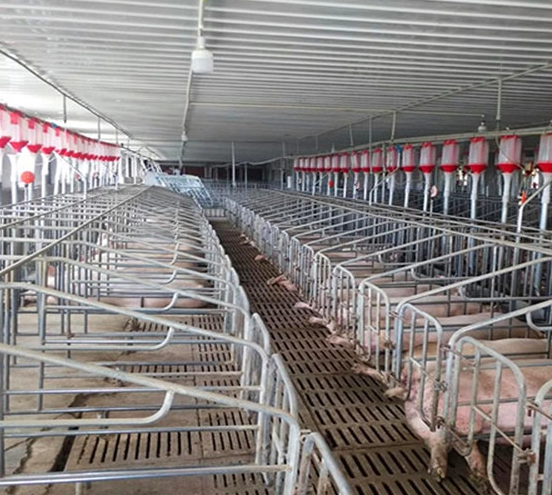
Modular Pig Housing: Durable and Hygienic Solutions for Modern Swine Farms
Swine farming today faces increasing challenges: maximizing productivity, maintaining hygiene, and reducing operational costs. Traditional pig housing often requires lengthy construction, high maintenance, and can pose biosecurity risks. Modular pig housing provides an innovative solution, combining prefabrication, durability, and operational efficiency to meet modern farm requirements.
This article explores the benefits, design strategies, and applications of modular pig housing for B2B swine operations.
What Is Modular Pig Housing?
Modular pig housing consists of prefabricated units built from steel frames, insulated panels, and durable roofing. These units are manufactured in a factory and assembled on-site, ensuring high-quality construction, rapid deployment, and long-term durability.
Unlike conventional brick or wooden pigsties, modular housing allows flexible layouts for pens, feeding areas, and waste management systems. Modular designs also make future expansion or relocation straightforward, without disrupting farm operations.
Key Advantages of Modular Pig Housing
- Rapid Construction
Prefabricated modules enable quick on-site assembly, significantly reducing downtime and allowing farms to scale operations faster. - Durability and Longevity
Steel frames resist rot, pests, and fire, while insulated panels provide thermal stability for year-round comfort. These structures require minimal repair over time. - Low Maintenance
Smooth, prefabricated surfaces are easy to clean and disinfect, reducing labor costs and minimizing disease risk. - Optimized Ventilation and Climate Control
Proper airflow and temperature regulation promote pig health, growth, and reproductive performance. - Flexible Layouts
Modular housing can be configured to accommodate different pig breeds, growth stages, and farm sizes. Expansion is simple and does not disrupt existing operations. - Biosecurity and Hygiene
Prefabricated surfaces, controlled access, and integrated waste systems improve sanitation and reduce the spread of diseases. - Sustainability
Steel is recyclable, and modular construction reduces material waste. Energy-efficient panels reduce heating and cooling costs, supporting environmentally responsible farming.
Design Considerations for Swine Farms
When planning modular pig housing, B2B clients should focus on:
- Pen Size and Density: Ensure adequate space for pigs to promote health and productivity.
- Feeding and Water Systems: Optimize for labor efficiency and animal access.
- Ventilation and Lighting: Natural light and airflow improve growth rates and welfare.
- Flooring and Waste Management: Non-slip floors with proper drainage ensure hygiene and safety.
- Future Expansion: Modular units should allow additional housing without disrupting current operations.
Applications Across the Swine Industry
Modular pig housing is suitable for:
- Commercial Pig Farms: Large-scale meat production with controlled climate and hygiene.
- Breeding Operations: Modular pens for sows, piglets, and boars with biosecure layouts.
- Research Facilities: Controlled housing for experimental studies or veterinary research.
- Integrated Livestock Farms: Multi-use modular barns suitable for pigs alongside other animals.
Case Studies
- Commercial Pig Farm (USA):
Installed modular pig housing with integrated ventilation and feeding systems. Achieved faster construction timelines and improved herd health. - Breeding Facility (Europe):
Added modular units to expand breeding operations without halting ongoing production. Improved operational efficiency and biosecurity. - Mixed Livestock Farm (Australia):
Constructed modular pig housing integrated with cattle and poultry operations. Flexible layout enabled future expansion while maintaining hygiene standards.
Why B2B Clients Should Consider Modular Pig Housing
Modular pig housing offers clear advantages for swine operations:
- Speed: Rapid assembly accelerates farm readiness.
- Durability: Steel frames and panels ensure long-term reliability.
- Low Maintenance: Easy cleaning and minimal repair reduce operational costs.
- Flexibility: Modular design allows expansion and reconfiguration.
- Animal Welfare: Proper climate control, ventilation, and space improve growth and productivity.
- Sustainability: Recyclable materials and energy-efficient design reduce environmental impact.
For commercial swine operations, modular pig housing is a strategic investment that enhances productivity, reduces costs, and ensures biosecure, hygienic environments.
Conclusion
Modular pig housing is transforming modern swine farming by providing fast, durable, and flexible housing solutions. Prefabrication, modular layouts, and optimized climate control support pig welfare, operational efficiency, and farm growth.
For B2B clients in the pig farming industry, investing in modular pig housing is a practical, sustainable, and cost-effective solution that meets the demands of modern livestock operations.
